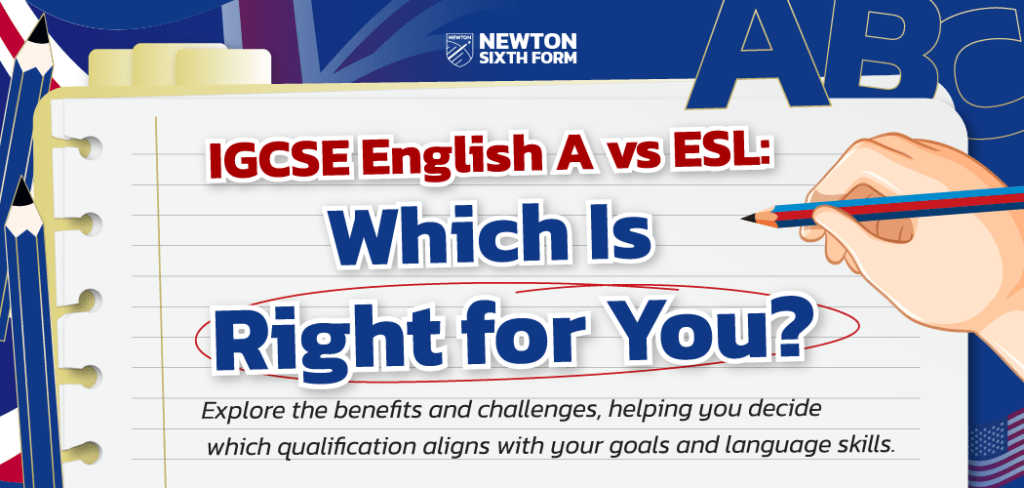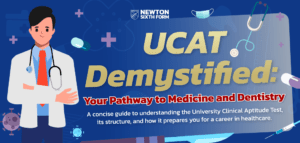IGCSE English A vs ESL: Which Is Right for You?
Explore the benefits and challenges, helping you decide which qualification aligns with your goals and language skills.

When applying to universities, both IGCSE English as a Second Language (ESL) and IGCSE English (First Language) A offer valuable advantages depending on the student’s goals and the specific requirements of their chosen universities. However, the two qualifications cater to different skill sets, which can present unique challenges depending on the student’s language proficiency and academic background.
Benefits and Common Issues in IGCSE English as a Second Language (ESL)
For students whose first language is not English, IGCSE English as a Second Language (ESL) is an important qualification that demonstrates a solid foundation in English communication skills. It highlights the student’s ability to effectively navigate both written and spoken English, making it especially valuable for university applications where English proficiency is a requirement. Additionally, many universities recognize IGCSE ESL as a valid alternative to other standardised English language tests such as IELTS or TOEFL, which can reduce the burden on students during the application process.
However, students taking IGCSE ESL may face some common challenges that stem from their language abilities. One of the primary issues is a limited range of vocabulary. Many ESL students, while competent in everyday communication, often struggle when required to engage with more sophisticated academic language. This limitation can hinder their ability to fully express ideas, particularly in more advanced writing tasks, which are common in university coursework. To overcome this, students should engage in regular reading and vocabulary-building exercises to expand their language repertoire.
Another frequent challenge for ESL students is the difficulty in adapting to academic writing. While the ESL curriculum focuses on practical language use, including reading, writing, listening, and speaking, it often lacks the depth of academic essay writing required for university-level work. This gap can leave students unprepared for tasks such as structured argumentation or in-depth analysis. To bridge this gap, students should practise writing longer essays with proper structure, focusing on developing introductions, body paragraphs, and conclusions.
Furthermore, ESL students may become too reliant on basic grammar structures. While they may be proficient in simple sentence construction, their hesitation to use more complex grammatical forms can limit their ability to communicate nuanced ideas. This becomes particularly noticeable when students are asked to engage in higher-level writing or speaking tasks. To develop their grammatical range, ESL students should focus on mastering more advanced language forms, which will allow them to express ideas more fluidly and confidently in academic settings.
Finally, a common issue seen in ESL learners is the imbalance between speaking and listening skills. Some students may excel in listening comprehension but find themselves struggling when asked to speak fluently or accurately in English. This is especially relevant when applying to universities that value communication skills. Regular practice, both in speaking with native or fluent English speakers and listening to a variety of English accents, can help improve both fluency and confidence.
Benefits and Common Issues in IGCSE English (First Language) A
IGCSE English (First Language) A is a more rigorous qualification, particularly for students aiming to apply to universities in English-speaking countries or competitive institutions. This course focuses on academic skills such as literary analysis, critical thinking, and sophisticated written communication, making it highly relevant for university-level work. Students who perform well in English A demonstrate an ability to engage with complex texts and express their thoughts clearly and persuasively, which can make a strong impression on university admissions committees.
However, students taking English A may also face a set of challenges that stem from the higher expectations of the course. One of the key difficulties is the requirement for literary analysis. English A demands that students not only read texts but also critically engage with them by identifying themes, literary devices, and authorial intent. For students who lack experience in literary studies, this can be a steep learning curve. To overcome this, students should practise breaking down texts into smaller components, such as identifying key themes and analysing the use of language, to develop a deeper understanding of how texts work.
Another issue that arises is the difficulty in structuring arguments in essays. English A requires students to not only understand the material but also to articulate their responses in a clear and coherent manner. Many students struggle with organising their thoughts into well-structured essays, which is a crucial skill for success both in exams and at university. To address this, students should focus on practising argumentative essay writing, ensuring they create strong thesis statements and logically organised paragraphs supported by evidence from the texts.
Additionally, the complexity of grammar and vocabulary in English A can be overwhelming for some students, particularly those who are non-native speakers. The course frequently deals with sophisticated language, which can lead to misunderstandings or difficulties in expressing ideas at the expected academic level. To mitigate this challenge, students should focus on reading a wide range of texts and practising paraphrasing difficult sentences in simpler language to enhance comprehension and expression.
Finally, time management during exams can be a significant issue for English A students. The course often requires students to complete multiple tasks, such as essay writing and reading comprehension, within a strict time limit. Some students struggle to manage their time effectively, resulting in incomplete or poorly structured answers. To improve in this area, students should practise under timed conditions, learning to plan and execute their responses efficiently.
In conclusion,
both IGCSE English as a Second Language (ESL) and IGCSE English (First Language) A offer valuable advantages for university applications. ESL provides a practical demonstration of language proficiency, particularly for students applying to universities where English is not the primary language of instruction. English A, on the other hand, offers a higher level of academic rigour, making it more suitable for competitive institutions and English-speaking universities.
However, students in both courses must be aware of the common challenges they might face based on their abilities, from vocabulary limitations and basic grammar reliance in ESL to literary analysis and time management difficulties in English A. By addressing these issues, students can strengthen their language skills and enhance their university applications, positioning themselves for academic success.
เขียนโดย: English Department, The Newton Sixth Form
เรียบเรียงโดย: Wareeya Saeyang Integrated Marketing Communication Officer






